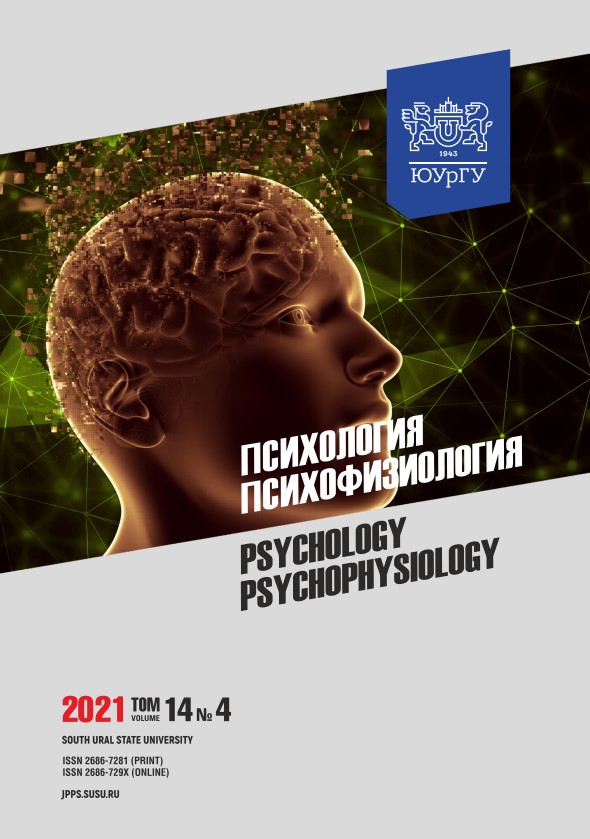EFFICIENCY OF MENTAL SELF-REGULATION OF FINAL YEAR UNIVERSITY STUDENTS DURING THE EXAM
Abstract
Abstract. The theoretical basis of the study is the concept of mental regulation with respect to which the formation of self-regulation mechanisms in students takes place due to the need to overcome conditions that impede learning. Aim: the paper aims to identify the signs of mental states, the methods of their self-regulation and the regulatory properties of final year university students with different levels of self-regulation. Materials and methods. The study involved 4th year students (psychologists and mathematicians) divided into groups with low and high levels of self-regulation during the exam. The author questionnaires and well-established methods of mental state assessment were used in the course of the study. Results. It was found that students with effective self-regulation most often experience positive mental states (concentration, reflection), while students with low levels of self-regulation more often and more intensely experience negative mental states (anxiety, sadness). The signs of mental states are shown for the students of different disciplines: in psychology students, as the level of self-regulation increases, the intensity of negative mental states decreases. The use of self-regulation methods was shown for the students of different disciplines: mathematics students often use such methods of regulation as listening to music and relaxation, while psychology students more often use methods that require conscious control over actions and thoughts such as suggestion and changing attitude to the situation. Conclusion. In our opinion, a special regulatory role should be assigned to the mental component: the relations between the regulatory process and structures of consciousness should be studied, as well as the contribution of the latter to mental states during the exam.
Downloads
References
2. This is Sergienko.A., Vilenskaya G.A., Kovaleva Yu.V. Kontrol povedeniya kak subektnaya regulyatsiya [Behavior control as subject regulation]. Moscow: Institute of Psychology of the Russian Academy of Sciences Publ. 2010:352. (in Russ.).
3. Baumeister R.F., Bratslavsky E., Muraven M. [et al.] Ego-depletion: is the active self a limited resource? Journal of Personality and Social Psychology. 1998;74:1252–1265
4. Schmeichel B.J., Baumeister R.F. Self-regulatory strength. Handbook of self-regulation: Research, theory, and applications. Ed. K.D. Vohs. NY: Guilford Press Publ. 2004:64–82.
5. Vohs K.D., Heatherton T.F. Self-regulatory failure: a resource-depletion approach. Psychological Science. 2000;11:243–254.
6. Carver C.S., Scheier M.F. On the self-regulation of behavior. NY: Cambridge University Press. 1998:460.
7. Berger A. Self-Regulation: Brain, Cognition, and Development (Human Brain Development Series). Washington D.C. Publ. American Psychological Association. 2011:225.
8. De Ridder D., de Wit J. Self-regulation in Health Behavior. Hoboken: John Wiley & Sons, 2006:264.
9. Muraven M., Slessareva E. Mechanisms of self-control failure: Motivation and limited resources. Personality and Social Psychology Bulletin. 2003;29(7):894–906. DOI: 10.1177/0146167203029007008.
10. Schunk D.H. Self-regulated learning: The educational legacy of Paul R. Pintrich. Educational Psychologist. 2005;40:85–94.
11. Calkins S.D., Howse R.B. Individual differences in self-regulation: Implications for childhood adjustment. The regulation of emotion. Ed. R. Feldman, P. Philippot. Mahwah, NY: Lawrence Erlbaum Associates Publ. 2004:307–332.
12. Kuhl J., Halish F. Action control: The maintenance of motivational states. Motivation, intention, and volition. Berlin: Springer. 1987:279–291.
13. Pulkinen L. Life style in personality development. European Journal of Personality. 1992;6(2):139–155.
14. Lazarus R.S. Stress and emotion: A new synthesis. NY. Publ. Springer. 1999:342.
15. Dikaya L.G. Psikhicheskaya samoregulyatsiya funktsionalnogo sostoyaniya cheloveka [Mental self-regulation of the functional state of a person]. Moscow: Institute of Psychology of the Russian Academy of Sciences Publ. 2003:318. (in Russ.).
16. Prokhorov A.O. [Structure-functional model of mental regulation of subjects psychic states]. Psikhologicheskii zhurnal = Psychological journal. 2020;41(1):5–18. (in Russ.). DOI: 10.31857/S020595920007852-3
17. Garner R. Metacognition and Reading Comprehension. NY. Publ. Ablex. 1987:165.
18. Garner R., Alexander P.A. Metacognition: Answered and unanswered questions. Educational Psychologist. 1989;24(2):143–158.
19. Gottman J.M., Katz L.F., Hooven C. Parental meta-emotion philosophy and the emotional life of families: Theoretical models and preliminary data. Journal of Family Psychology. 1996;10(3):243–268.
20. Zeidner M. Anxiety and coping with community disasters: The Israeli experience. Journal of Research in Personality. 2007;41:213–220.
21. Barrett L.F. How emotions are made: The secret life of the brain. Boston. Publ. Houghton Mifflin Harcourt. 2017:449.
22. Lomov B.F. Psikhicheskaya regulyatsiya deyatelnosti: Izbrannye trudy [Mental regulation of activity: Selected works]. Moscow: Institute of Psychology of the Russian Academy of Sciences Publ. 2006:624. (in Russ.).
References on translit
-Copyright (c) 2021 Psychology. Psychophysiology

This work is licensed under a Creative Commons Attribution-NonCommercial-NoDerivatives 4.0 International License.



